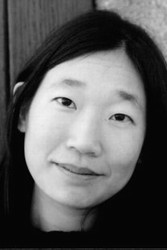
But I was thinking about the movement of artistic practices and artistic expression and how we take up one tool that might come from far away and use it to express a very personal self.

I can play piano very poorly, I learned for a few years when I was a kid so I can read music but that’s the limit of it. It was one of the biggest challenges of writing the book, because I’m not a musician. I was wondering if you could talk a little bit about that, the difficulty of writing about music and translating the sensation of music for a reading audience? You also talk about the way music works, the meaning folded inside it, the time that spans through it.

My knowledge of classical music is limited to knowing it exists but as I was reading your novel I felt moved to put on the music as I was reading about it to hear what they were hearing or to learn what they were learning. We often know about the writers who are targeted by totalitarian regimes but looking at musicians is another way in to thinking about what’s threatening to this consolidation of power. I started thinking about what was it about music that could be so threatening. I’d been writing about Cambodia before that – the Cambodian genocide – and one thing I’d been thinking a lot about were the musicians.

What gave them the courage to stand up to the government? And, what made them come into the streets to want to protect, in many ways, their children, and another generation? So I think that’s why it ended up going backwards into the Cultural Revolution. And as I was thinking about it over the years I started to think about not only the students, but also the one million Beijing citizens that came into the streets, and especially that older generation. It was something I remembered so vividly from my teenage years, watching it all unfold on 24-hour news, and it stayed with me, the 6 weeks of demonstrations and the many points where it looked like things could have turned in a very different direction. You know, when I started, I thought I was writing about something very specific, which was the 1989 demonstrations in Tiananmen Square, that’s where I had started.

So I suppose the first question I wanted to ask: was why tackle such a huge subject? The Chinese Cultural Revolution was an enormous thing – what made you want to write it now? So, you have written an incredibly beautiful, epic novel, Do Not Say We Have Nothing. They talk about translating the sensation of music for a reader, the importance of writing about women of colour, and the Chinese conceptual framework of time. In this edition of the Granta Podcast, editor Ka Bradley speaks with Madeleine Thien about her book, Do Not Say We Have Nothing, which has recently been shortlisted for the Man Booker Prize.


 0 kommentar(er)
0 kommentar(er)
